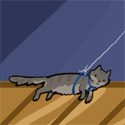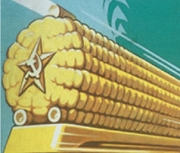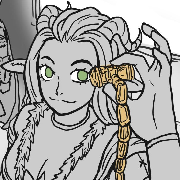|
What is the most powerful flying bug? This poll is closed. |
|||
|---|---|---|---|
| 🦋 |
|
15 | 3.71% |
| 🦇 |
|
115 | 28.47% |
| 🪰 |
|
12 | 2.97% |
| 🐦 |
|
67 | 16.58% |
| dragonfly |
|
94 | 23.27% |
| 🦟 |
|
14 | 3.47% |
| 🐝 |
|
87 | 21.53% |
| Total: | 404 votes | ||
|
Imagine being president of a country that doesn't have civilian control over the armed forces. Must be crazy
|
|
|
|

|
| # ? May 23, 2024 13:57 |
|
OctaMurk posted:bay of prigs
|
|
|
|
this is the funniest newsday since that ship got stuck in the canal
|
|
|
|
OctaMurk posted:bay of prigs
|
|
|
|
so lemme get this straight Wagner hadn't been paid in a while, AND wanted to go super murder on Ukraine? so they threatened...whatever they threatened and drove toward moscow but before they got anywhere near moscow, they got paid, and called it off?
|
|
|
|
AnimeIsTrash posted:https://twitter.com/diawlectical/status/1672688056426528768?cxt=HHwWgIC89Zm7yrYuAAAA whats his username
|
|
|
|
Meow Tse-tung posted:this is the funniest newsday since that ship got stuck in the canal We'll have to make do with a T-90 stuck at the entrance to a circus
|
|
|
|
Meow Tse-tung posted:this is the funniest newsday since that ship got stuck in the canal да
|
|
|
|
Also Prigozhin just packing up and going away clinches this as Russia's jan 6th.
|
|
|
|
Also re: soldiers and honour and will: There's a Belgian show (Kamp Waes) where regular civilians (pre-selected for fitness) get to go into special forces training (run by currently active and recently retired operators) for about a week to see if they can make it to the end. There's also a Dutch adaptation (Kamp van Koningsbrugge) of it, with the exact same format with the Korps Commandotroepen. Anyway, in that show the commandos talk quite regularly about how you "have to will/want (in Dutch it's the same word) to succeed", where they put heavy emphasis on the word "will" and also whenever it comes to giving up the thing that gets repeated is that it is "beneath/against my honor" to give up. All that stuff is certainly starting to be put into a certain context the more you talk about this poo poo, FF.
|
|
|
|
If anything, this makes Ukraine with an infinite supply of western money and weapons getting its rear end beat even more embarrassing
|
|
|
|
JAY ZERO SUM GAME posted:so lemme get this straight Idk
|
|
|
|
bla bla bla then just finish this then, attack! End this farce. I hate the twitter front JAY ZERO SUM GAME posted:so lemme get this straight well in one video Prigozhin seemed to sympathize with Ukraine, then in another he was angry they hadn't blown more of it up
|
|
|
|
JAY ZERO SUM GAME posted:so lemme get this straight we are currently on level 3 of disinformatika
|
|
|
|
ukraine is the Avengers of countries
|
|
|
|
cool ty
|
|
|
|
JAY ZERO SUM GAME posted:so lemme get this straight The real reason is that Prig got really skittish that he was going to be thrown from a window following the integration of the mercs into the regular army in july. So he did a big show, sold his dudes out for an asylum package in belarus.
|
|
|
|
Tiler Kiwi posted:ukraine is the Avengers of countries Only virgins have ever paid attention to it
|
|
|
|
People who gently caress are intimately familiar with the Russian situation
|
|
|
|
people who thought moscow was going to fall and have to come to terms with prig going to retire peacefully and not being killed ftw lol. it makes for great reading.
|
|
|
|
good evening. is Putin overthrown yet?
|
|
|
|
https://twitter.com/ilya_shepelin/status/1672707307044569090
|
|
|
|
my bony fealty posted:good evening. is Putin overthrown yet? yup
|
|
|
|
I don't think Prigozhin had anything close to a corps. A motorized battalion in road march is something like 4 miles long, which itself is much longer than any of the columns we saw last night. A corps traveling down the same road would be like a hundred miles long. I think there were probably less than a thousand mutineers overall.
|
|
|
|
my bony fealty posted:good evening. is Putin overthrown yet? Yeah he threw the towel over Prig to trick him that it’s nighttime so he can go to sleep.
|
|
|
|
sum posted:I don't think Prigozhin had anything close to a corps. A motorized battalion in road march is something like 4 miles long, which itself is much longer than any of the columns we saw last night. A corps traveling down the same road would be like a hundred miles long. I think there were probably less than a thousand mutineers overall. he had maybe 100 in Rostov and another 100 on the road to Moscow it looked like
|
|
|
|
drat I just woke up and the mutiny is already over
|
|
|
|
Frosted Flake posted:This is one of those areas where if you want to be a Marxist Historian, this is an opportunity to break new ground. Trying to find the source for this, is this from a book or a journal? I could only find a preview PDF from Brill that was very unhelpful...
|
|
|
|
Raskolnikov38 posted:he had maybe 100 in Rostov and another 100 on the road to Moscow it looked like yeah, the fact they didn't get blown the gently caress up is very weird. Also his lovely little convoy managed to shoot down helicopters and kill Russian pilots and that was fine apparantly
|
|
|
|
sum posted:I don't think Prigozhin had anything close to a corps. A motorized battalion in road march is something like 4 miles long, which itself is much longer than any of the columns we saw last night. A corps traveling down the same road would be like a hundred miles long. I think there were probably less than a thousand mutineers overall. yeah i mean wagner as a whole organization is like corps sized, even though a relatively small portion was doin the thing (mutiny? Coup? Labor negotiation?)
|
|
|
|
The flow of smug neoliberals coming to cheer on the nazis has slowed to a trickle
|
|
|
|
Nix Panicus posted:The flow of smug neoliberals coming to cheer on the nazis has slowed to a trickle They'll be back, never fear. Like a moth to a flame.
|
|
|
|
Nix Panicus posted:The flow of smug neoliberals coming to cheer on the nazis has slowed to a trickle they are just regrouping for the next offensive
|
|
|
|
sum posted:In this war, there are months where nothing happens, and there are days where nothing happens but much faster
|
|
|
|
Nix Panicus posted:The flow of smug neoliberals coming to cheer on the nazis has slowed to a trickle if you think about it they’re the real victims here
|
|
|
|
lol a peaceful American protest (that didn't do anything wrong and were just freedom loving patriots who wanted a tour of the Capitol Building) gets closer to overthrowing their government than 25 million (reported) brave Russian freedom fighters who gave up 200 miles from their capital. USA! USA! USA!
|
|
|
|
https://twitter.com/SethAbramson/status/1672706969898033152 https://twitter.com/SethAbramson/status/1672708689415884802?cxt=HHwWhMC-1Zns07YuAAAA Saaayyy…just what the heck IS going on here anyway???  Also lol a negotiating freedom in exchange for information about TRUMP
|
|
|
|
fits my needs posted:they are just regrouping for the next offensive speng31b made a deal with them and they turned around and headed back to gbs, supposedly they will all get pushed out of windows later
|
|
|
|
You're not a main character of history unless you stall out in front of Moscow.
|
|
|
|

|
| # ? May 23, 2024 13:57 |
|
Eh, Belarus might be safer than it seems. One of Lukashenko's primary political goals is to remain both very friendly with and also independent from Russia. Having a guy like Prigozhin stashed away might help with that.
|
|
|

































